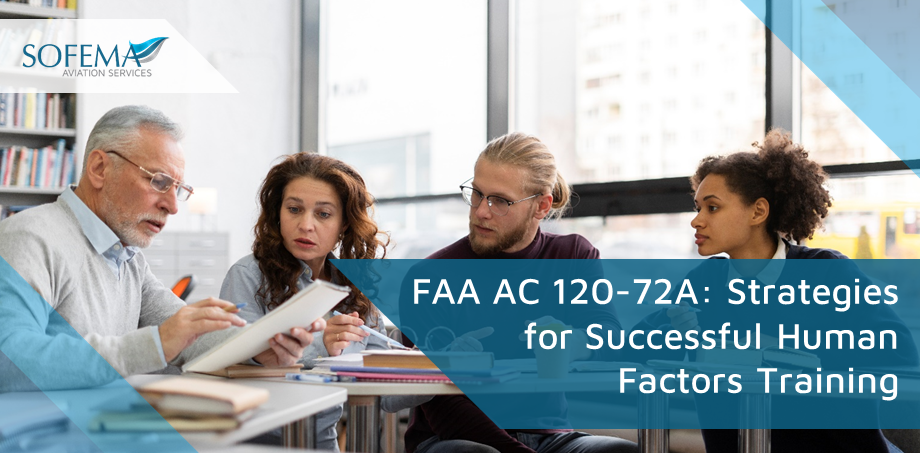Sofema Aviation Services (SAS) www.sassofia.com considers key challenges impacting the effective delivery of FAA AC 120-72A Training
Introduction
Delivering the content of AC 120-72A to an adult audience can pose several challenges. Understanding these challenges and implementing strategies to enhance engagement is crucial for effective FAA AC 120-72A Training.
Consider the following:
Complex and Technical Content – AC 120-72A contains highly technical and complex material that can be difficult for some adult learners to understand and retain.
o Simplify complex concepts using analogies and real-world examples.
o Break down technical jargon into more understandable language and provide glossaries for reference.
Adult Learning Preferences – Adults have diverse learning preferences and may not all respond well to traditional lecture-based training.
o Incorporate a variety of teaching methods, including interactive activities, discussions, and hands-on exercises.
o Use multimedia tools such as videos, animations, and simulations where possible to cater to different learning styles.
Retention of Information – Retaining large amounts of information can be challenging, especially if the content is not immediately applicable to the learners’ daily tasks.
o Use spaced repetition and periodic reviews to reinforce learning.
o Incorporate case studies and practical scenarios that relate directly to the participants’ work environments.
Engagement and Motivation – Maintaining engagement and motivation can be challenging, especially for longer sessions.
o Implement interactive elements such as quizzes, group activities, and discussions.
o Encourage participation by relating the material to the learners’ experiences and showing the practical benefits of the training.
Varying Levels of Pre-existing Knowledge – Participants may have different levels of pre-existing knowledge, making it difficult to pitch the training at the right level.
o Conduct a pre-assessment to gauge the knowledge level of participants and tailor the training accordingly.
o Provide optional supplementary materials for those who need more foundational knowledge.
Time Constraints – Adults often have tight schedules and may find committing to lengthy training sessions challenging.
o Design the training to be concise and focused.
o Offer the training in modular formats that can be completed in shorter, more manageable sessions.
Strategies to Improve Engagement – Active Learning Techniques
o Use active learning techniques such as group discussions, problem-solving activities, and hands-on practice.
o Encourage participants to share their experiences and insights related to the topics being covered.
Real-world Applications – Present case studies and real-world scenarios that illustrate the application of theoretical concepts.
Feedback and Assessment – Provide regular opportunities for feedback and self-assessment.
o Use formative assessments like quizzes and short tests to reinforce learning and identify areas that need further explanation.
Peer Learning and Collaboration
o Foster a collaborative learning environment where participants can learn from each other.
o Organize group projects or tasks that require teamwork and collective problem-solving.
Next Steps
Follow this link to our Library to find & download related documents for Free.
Sofema Aviation Services and Sofema Online provides Training for Trainers to support organizations wishing to develop EASA compliant internal Part 145 Initial and Recurrent Training. Please see the websites or email team@sassofia.com
Tags:
Self-Assessment and Reflection, FAA AC 120-72A Training, learners' experience, pre-assessment, active learning techniques, Retention of Information, Adult Learning Preferences, Complex and Technical Content, FAA AC 120-72A, Aviation Collaboration, develop strategies, Engagement in Adult Learning, Adult learning process, peer learning, Case Studies, Improvement, Adult learners, aviation human factors, Feedback, Assessment, Human Factor Train the Trainer, Human Factors Training, HF Train the Trainer





